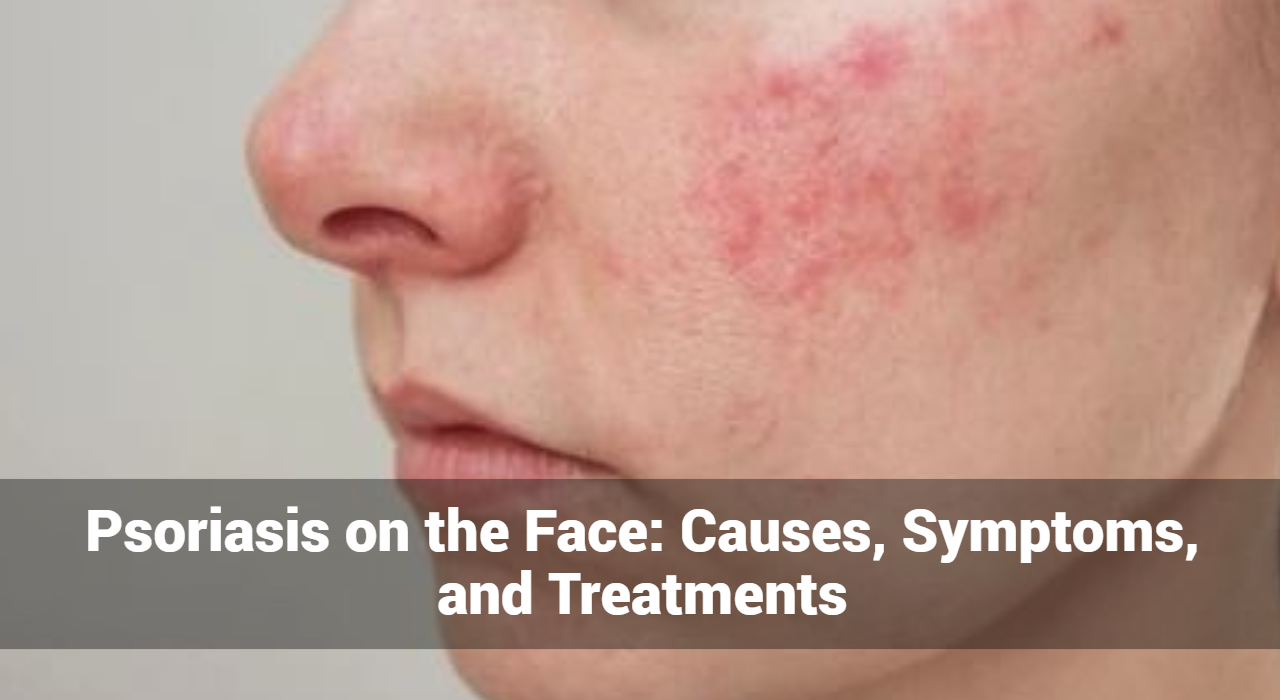Psoriasis on the Face: Causes, Symptoms, and Treatments

Psoriasis is a chronic skin condition that affects millions of people worldwide. While it can appear on various parts of the body, psoriasis on the face can be particularly challenging due to its visibility and the delicate nature of facial skin. Understanding the causes, recognizing the symptoms, and exploring effective treatments are crucial for managing this condition. This comprehensive guide delves into all aspects of facial psoriasis, providing valuable insights for those affected by this persistent skin issue.
What is Psoriasis?
Psoriasis is an autoimmune disorder characterized by the rapid turnover of skin cells, leading to the formation of thick, scaly patches. These patches, often referred to as plaques, can be itchy, red, and inflamed. While psoriasis can manifest anywhere on the body, facial psoriasis specifically impacts areas such as the eyebrows, upper forehead, hairline, and the skin between the nose and upper lip.
Causes of Psoriasis on the Face
The exact cause of psoriasis remains unknown, but it is believed to be a combination of genetic, environmental, and immune system factors. Here are some key factors contributing to psoriasis on the face:
- Genetics: A family history of psoriasis increases the likelihood of developing the condition.
- Immune System Dysfunction: Psoriasis is an autoimmune disorder where the immune system mistakenly attacks healthy skin cells, accelerating their production and leading to the formation of plaques.
- Environmental Triggers: Factors such as stress, smoking, alcohol consumption, and certain medications can trigger or worsen psoriasis.
- Infections: Infections, particularly streptococcal throat infections, can trigger facial psoriasis in some individuals.
Track and Manage your Eczema treatment using a comprehensive Eczema App
Download Eczemaless now
What Are The Symptoms of Psoriasis on the Face?
Identifying the symptoms of psoriasis on the face is crucial for early diagnosis and effective management. Common symptoms include:
- Red Patches: Well-defined red patches on the facial skin.
- Scales: Silvery-white scales covering the red patches.
- Dry Skin: Excessive dryness leading to cracking and bleeding.
- Itchiness and Burning: Persistent itching and a burning sensation on the affected areas.
- Swelling: Inflammation and swelling around the plaques.
What Types of Psoriasis on the Face?
Psoriasis on the face can present in various forms, including:
- Plaque Psoriasis: The most common type, characterized by raised, red patches with a silvery scale.
- Guttate Psoriasis: Small, dot-like lesions, often triggered by infections.
- Inverse Psoriasis: Smooth, red lesions that occur in skin folds.
- Erythrodermic Psoriasis: A rare, severe form causing widespread redness and shedding of the skin.
Diagnosing Psoriasis on the Face
A dermatologist typically diagnoses psoriasis based on the appearance of the skin. In some cases, a skin biopsy may be performed to confirm the diagnosis and rule out other skin conditions. A thorough medical history and examination help identify potential triggers and co-existing conditions.
What Are The Treatment Options for Psoriasis on the Face?
Treating psoriasis on the face requires careful consideration due to the delicate nature of facial skin. The goal of treatment is to reduce inflammation, slow the rapid growth of skin cells, and clear plaques. Here are the main treatment options:
Topical Treatments
- Corticosteroids
- Mild to Moderate Corticosteroids: These are often the first line of treatment. They reduce inflammation and slow down skin cell turnover. Examples include hydrocortisone and desonide.
- Usage: Apply sparingly to affected areas, as long-term use can cause thinning of the skin and other side effects.
- Vitamin D Analogues
- Calcipotriol (Calcipotriene) and Calcitriol: These help to normalize skin cell production and reduce scaling. They are less likely to cause skin thinning compared to corticosteroids.
- Usage: Often used in combination with corticosteroids for enhanced effectiveness.
- Calcineurin Inhibitors
- Tacrolimus (Protopic) and Pimecrolimus (Elidel): These are non-steroidal treatments that reduce inflammation and are suitable for sensitive areas like the face. They do not cause skin thinning.
- Usage: Applied twice daily to affected areas, particularly useful for delicate skin regions.
- Moisturizers
- Emollients and Hydrating Creams: Regular use of moisturizers helps to manage dryness, reduce scaling, and maintain skin hydration. Look for products free from fragrances and irritants.
- Usage: Apply multiple times daily, especially after washing the face.
GET IN CONTROL OF YOUR ECZEMA
Use our AI tool to check the severity of Eczema and keep track of your Eczema progress.
Phototherapy
- UVB Therapy
- Narrowband UVB Therapy: Involves exposure to ultraviolet B light under medical supervision. It can slow down the growth of affected skin cells.
- Usage: Typically performed in a dermatologist’s office, requiring multiple sessions per week.
- PUVA Therapy
- Psoralen + UVA Therapy: Combines psoralen medication with exposure to UVA light. Psoralen makes the skin more sensitive to light, enhancing the effectiveness of UVA therapy.
- Usage: Often reserved for more severe cases and requires careful monitoring due to potential side effects.
Systemic Treatments
For moderate to severe facial psoriasis, systemic treatments may be necessary. These are usually prescribed when topical treatments are insufficient.
- Oral Medications
- Methotrexate: Reduces inflammation and slows skin cell production. Requires regular blood tests to monitor for side effects.
- Cyclosporine: An immunosuppressant that can rapidly improve symptoms but is usually used short-term due to potential side effects.
- Acitretin: A retinoid that normalizes skin cell growth. Not suitable for pregnant women due to risk of birth defects.
- Biologic Therapies
- Adalimumab (Humira), Etanercept (Enbrel), Infliximab (Remicade): These target specific parts of the immune system to control inflammation and reduce symptoms.
- Usage: Administered via injection or infusion, often requiring regular monitoring by a healthcare professional.
Lifestyle And Natural Home Remedies That Really Work Against Psoriasis
- Stress Management
- Techniques: Yoga, meditation, and mindfulness can help manage stress, which is a known trigger for psoriasis flare-ups.
- Impact: Reducing stress can lead to fewer flare-ups and improved overall well-being.
- Healthy Diet
- Anti-inflammatory Foods: Include fruits, vegetables, whole grains, and fatty fish rich in omega-3 fatty acids. Avoid foods that can trigger inflammation, such as processed foods and sugary items.
- Hydration: Drinking plenty of water helps maintain skin hydration and overall health.
- Skincare Routine
- Gentle Cleansers: Use mild, fragrance-free cleansers to avoid irritation. Avoid hot water, as it can dry out the skin.
- Regular Moisturizing: Apply moisturizers immediately after washing the face to lock in moisture. Use products specifically designed for sensitive skin.
Emerging Treatments
- Topical Janus Kinase (JAK) Inhibitors
- Ruxolitinib Cream: An emerging treatment showing promise in reducing inflammation and skin cell production in psoriasis. Clinical trials are ongoing to establish its effectiveness and safety for facial psoriasis.
- Laser Therapy
- Excimer Laser: Delivers targeted UVB light to affected areas, which can be effective for small patches of facial psoriasis. Requires multiple sessions.
Conclusion
Psoriasis on the face, while challenging, can be managed effectively with the right approach. Understanding the causes, recognizing the symptoms, and exploring various treatment options are essential steps in managing this condition. By adopting a holistic approach that includes medical treatments, lifestyle changes, and emotional support, individuals with facial psoriasis can lead a fulfilling life.
For more information and support, consult a dermatologist and consider joining psoriasis support communities. Managing psoriasis is a journey, and with the right resources, it is possible to navigate it successfully.
Track and Manage your Eczema treatment using a comprehensive Eczema App
Download Eczemaless now



